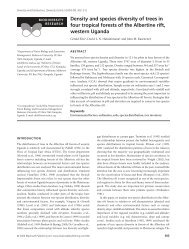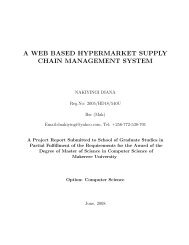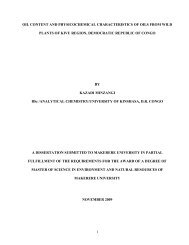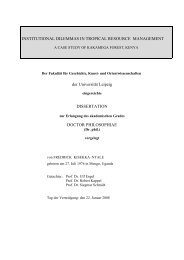lntroduction - Makerere University Research Repository
lntroduction - Makerere University Research Repository
lntroduction - Makerere University Research Repository
You also want an ePaper? Increase the reach of your titles
YUMPU automatically turns print PDFs into web optimized ePapers that Google loves.
49 SA Jnl Libs & Info Sci 2002.68(1)<br />
used in decision-making, solving problems and enhancing performance. It enables women to identify suitable<br />
products, equipment and materials, and to identify suitable suppliers. Women can use information in monitoring<br />
changes in their business activities and performance thereby identifying opportunities and threats. If user] rvrsely,<br />
information reduces uncertainty, and enables them to identify alternative solutions to business problems.<br />
Taking Botswana women as an example, what could be said of Uganda women in the informal sector? The<br />
findings reflect the demographic characteristics of respondents. Very few women who are doing business in the<br />
informal sector are well educated. Most women seek information informallv. Social factors disrupt women's<br />
capacity to seek information.<br />
The disabling factors include social restrictions such as those imposed by family demands, their spouses,<br />
illiteracy, ignorance and poverty at the personal level. At the institutional level, women do not know where to get<br />
information. These factors appear to corroborate the findings of Huyer (1991), who cites disabling factors to<br />
information access. These factors include: illiteracy, being taken out of school at an early age to save school fees, to<br />
many, to ease theirmother's workload, orbecause of pregnancy which often occurs at an early age. She also cites<br />
poverty, low social status, the multiple roles of child bearing, farming and household chores, concentration in lowlevel<br />
employment, lack of autonomy and lack of time. lack of radios, etc. as other factors. Qunta (1987:187)<br />
identifies illiteracy among women as one of the major factors hampering dissemination of information to women.<br />
Most of them are not able to write and read. That situation is compounded by inadequacy of communication<br />
networks. Ngimwa, Ocholla & Ojiambo (1997:56), citing problems hindering Kenya women from accessing<br />
information, identify time constraints, low literacy levels, economic and cultural constraints, uneven distribution of<br />
information infrastructures as factors making it difficult for women to access information.<br />
However, the importance of information and the means to transmit and disseminate it for development is well<br />
recognised. The International Development <strong>Research</strong> Centre's (IDRC) Gender and Information Group identifies the<br />
critical information issues for women. lt lists (1) type of information - what kind, access to it, and gender<br />
consciousness, and (2) information technology process availability of technologies to women, their ease of use.<br />
policy processes around these technologies, and their effects on women (Huyer, 1997). Some studies reveal that<br />
women have been successful once they are supported with the right information.<br />
Since 1971, there has been fighting in Uganda. The people most affected are always women who are left behind<br />
to cater for children, and the elderly. They are always a majority in security camps that are hurriedly set up to try to<br />
safeguard the lives of those surviving. Unfortunately, conditions in camps are always far from being habitable.<br />
Women would love information that demands concrete projects and actions that express peace through dialogue, and<br />
the change from war to peace. Peace in the minds of women is most important, believing as they do that in most<br />
cases wars are caused by men.<br />
As defined earlier, the informal sector of Uganda constitutes a business sector with tiny units involving very<br />
small sums of money for a majority of people. Women's need for information on sources of credit is a sign of<br />
limited knowledge of institutions that can help them. Women need money to expand their businesses. There are<br />
agencies that offer credit, but a majority of women are not aware of them. No directory of these institutions is<br />
available to help women learn about them. A directory of these institutions and making thern widely known to<br />
women would be helpful.<br />
Business requires a broad knowledge of many issues pertaining to markets, sources of raw materials,<br />
competitors, etc. Without such knowledge, business will not run well. It is for this reason that women need advisory<br />
information. The implications are that working capital is very small. It supporls an argument that businesses are tiny<br />
and therefore operating at a subsistence level for most of them. Women are also willing to listen to advice. They are<br />
willing partners in development. Most importantly, they are very clever with their heads and hands.<br />
It has been established that women in the informal sector have low education, a problem that stretches back to<br />
cultural preferences. For women to enter competitive ventures or even improve on the existing ones. training is<br />
essential. Training is a significant need for everybody including women because it is the way of gaining business<br />
competencies. UWEAL (1999) recognises that training for women is necessary because much of the husiness<br />
training in Uganda has been technical training for employment (ob seekers), not technical training for business<br />
creation. According to this organisation, training for job seeking and job creation need to be combined" because the<br />
market demands a product/service with both skills from the entrepreneur. Women therefore require skills to do<br />
better in all business aspects and that is why they are voicing a need fcrr training. It is why women need informatiou<br />
about agencies that provide training.






